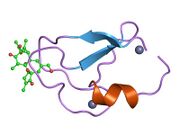Biology:PRKCD
 Generic protein structure example |
Protein kinase C delta type (or PKC-δ) is an enzyme that in humans is encoded by the PRKCD gene.[1]
Function
Protein kinase C (PKC) is a family of serine- and threonine-specific protein kinases that can be activated by the second messenger diacylglycerol.[2] PKC family members phosphorylate a wide variety of protein targets and are known to be involved in diverse cellular signaling pathways. PKC family members also serve as major receptors for phorbol esters, a class of tumor promoters. Each member of the PKC family has a specific expression profile and is believed to play distinct roles in cells. The protein encoded by this gene is one of the PKC family members. Studies both in human and mice demonstrate that this kinase is involved in B cell signaling and in the regulation of growth, apoptosis, and differentiation of a variety of cell types.[3] Protein kinase C delta is also regulated by phosphorylation on various serine/threonine (e.g. T50, T141, S304, T451, T505, S506, T507, S643, S664) and tyrosine residues including Y311 (by SRC).[4][5]
Interactions
PRKCD has been shown to interact with:
- C1QBP,[6]
- HER2/neu,[7]
- INSR,[8][9]
- MUC1,[10]
- mTOR,[11]
- PLD2,[12]
- PTPN6,[13]
- PTPRM,[14]
- PDPK1,[15]
- RASGRP3,[16]
- SHC1[17] and
- STAT1.[18]
References
- ↑ "Assignment of the protein kinase C delta polypeptide gene (PRKCD) to human chromosome 3 and mouse chromosome 14". Genomics 19 (1): 161–2. June 1994. doi:10.1006/geno.1994.1028. PMID 8188219. https://zenodo.org/record/1229594.
- ↑ Kikkawa, Ushio (2002). "Protein Kinase Cδ (PKCδ): Activaton Mechanisms and Functions". The Journal of Biochemistry 132 (6): 831–839. doi:10.1093/oxfordjournals.jbchem.a003294. PMID 12473183. https://www.jstage.jst.go.jp/article/biochemistry1922/132/6/132_6_831/_article. Retrieved June 30, 2008.
- ↑ "Entrez Gene: PRKCD protein kinase C, delta". https://www.ncbi.nlm.nih.gov/sites/entrez?Db=gene&Cmd=ShowDetailView&TermToSearch=5580.
- ↑ "Protein kinase C delta is phosphorylated on five novel Ser/Thr sites following inducible overexpression in human colorectal cancer cells". Protein Sci. 16 (12): 2711–5. December 2007. doi:10.1110/ps.072874607. PMID 17965192.
- ↑ "Src promotes PKCdelta degradation". Cell Growth Differ. 10 (4): 231–41. April 1999. PMID 10319993.
- ↑ "Protein kinase C [micro] is regulated by the multifunctional chaperon protein p32". J. Biol. Chem. 275 (32): 24601–7. August 2000. doi:10.1074/jbc.M002964200. PMID 10831594.
- ↑ Keshamouni, V. G. (17 April 2002). "Mechanism of 17-beta -Estradiol-induced Erk1/2 Activation in Breast Cancer Cells. A ROLE FOR HER2 AND PKC-delta". Journal of Biological Chemistry 277 (25): 22558–22565. doi:10.1074/jbc.M202351200. PMID 11960991.
- ↑ "Insulin induces specific interaction between insulin receptor and protein kinase C delta in primary cultured skeletal muscle". Mol. Endocrinol. 15 (4): 565–74. April 2001. doi:10.1210/mend.15.4.0612. PMID 11266508.
- ↑ "Differential effects of tumor necrosis factor-alpha on protein kinase C isoforms alpha and delta mediate inhibition of insulin receptor signaling". Diabetes 51 (6): 1921–30. June 2002. doi:10.2337/diabetes.51.6.1921. PMID 12031982.
- ↑ "Protein kinase C delta regulates function of the DF3/MUC1 carcinoma antigen in beta-catenin signaling". J. Biol. Chem. 277 (20): 17616–22. May 2002. doi:10.1074/jbc.M200436200. PMID 11877440.
- ↑ "Functional interaction between RAFT1/FRAP/mTOR and protein kinase cdelta in the regulation of cap-dependent initiation of translation". EMBO J. 19 (5): 1087–97. March 2000. doi:10.1093/emboj/19.5.1087. PMID 10698949.
- ↑ "Phosphorylation-dependent regulation of phospholipase D2 by protein kinase C delta in rat Pheochromocytoma PC12 cells". J. Biol. Chem. 277 (10): 8290–7. March 2002. doi:10.1074/jbc.M108343200. PMID 11744693.
- ↑ "Negative regulation of the SHPTP1 protein tyrosine phosphatase by protein kinase C delta in response to DNA damage". Mol. Pharmacol. 60 (6): 1431–8. December 2001. doi:10.1124/mol.60.6.1431. PMID 11723252.
- ↑ "Identification of phospholipase C gamma1 as a protein tyrosine phosphatase mu substrate that regulates cell migration". J. Cell. Biochem. 112 (1): 39–48. 2011. doi:10.1002/jcb.22710. PMID 20506511.
- ↑ "Regulation of both PDK1 and the phosphorylation of PKC-zeta and -delta by a C-terminal PRK2 fragment". Biochemistry 41 (2): 561–9. January 2002. doi:10.1021/bi010719z. PMID 11781095.
- ↑ "PKCdelta associates with and is involved in the phosphorylation of RasGRP3 in response to phorbol esters". Mol. Pharmacol. 66 (1): 76–84. July 2004. doi:10.1124/mol.66.1.76. PMID 15213298.
- ↑ "Protein kinase C-delta is a negative regulator of antigen-induced mast cell degranulation". Mol. Cell. Biol. 22 (12): 3970–80. June 2002. doi:10.1128/mcb.22.12.3970-3980.2002. PMID 12024011.
- ↑ "Stimulation of signal transducer and activator of transcription-1 (STAT1)-dependent gene transcription by lipopolysaccharide and interferon-gamma is regulated by mammalian target of rapamycin". J. Biol. Chem. 278 (36): 33637–44. September 2003. doi:10.1074/jbc.M301053200. PMID 12807916.
Further reading
- "Glycogen synthase kinase-3: properties, functions, and regulation". Chem. Rev. 101 (8): 2527–40. 2002. doi:10.1021/cr000110o. PMID 11749387.
- "The use of fluorescent phorbol esters in studies of protein kinase C-membrane interactions". Chem. Phys. Lipids 116 (1–2): 75–91. 2003. doi:10.1016/S0009-3084(02)00021-X. PMID 12093536.
- "Regulation of cell apoptosis by protein kinase c delta". Apoptosis 8 (1): 19–27. 2003. doi:10.1023/A:1021640817208. PMID 12510148.
 |





